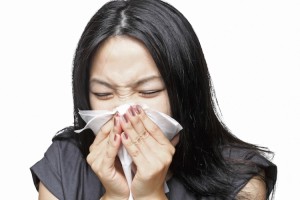Board certified ear, nose and throat (ENT) specialist at Riverview Health
 Even though we may be tired of being in the grip of freezing winter weather, it’s never too early to plan for the often draining effects of the upcoming allergy season. Recently, the American Academy of Otolaryngology-Head and Neck Surgery published its Clinical Practice Guidelines for allergic rhinitis, or more commonly known as allergies. The guidelines help doctors and patients understand the best ways to treat allergies.
Even though we may be tired of being in the grip of freezing winter weather, it’s never too early to plan for the often draining effects of the upcoming allergy season. Recently, the American Academy of Otolaryngology-Head and Neck Surgery published its Clinical Practice Guidelines for allergic rhinitis, or more commonly known as allergies. The guidelines help doctors and patients understand the best ways to treat allergies.
For those of us who suffer from allergic rhinitis, it’s important to know what causes our allergic reactions and to avoid the allergens that trigger our symptoms of nasal congestion, a runny or itchy nose, and fits of sneezing.
What are allergens?
Allergens are small, normally harmless proteins that come into contact with the skin, nose, eyes, breathing tract and digestive tract. They can be touched, breathed into the lungs, swallowed or injected. They trigger the production of antibodies, which bind to immune system cells throughout the body. These cells release chemicals, which then cause tissue swelling, itching and, sometimes, more severe reactions.
How can I control my allergy symptoms?
If you suffer from a known allergy, it’s best to try and control allergens in your environment. This can include limiting your exposure to pets, using bed covers, cleaning up mold and mildew and using air filtration systems. When allergens just can’t be avoided, there are medical options you can use to help tame your allergies.
What are my treatment options?
If you have mostly nasal symptoms, you should talk to your doctor about steroid nasal sprays, which include non-prescription Flonase and Nasacort AQ. When your main complaint is sneezing and itching, the first line of therapy should include non-sedating antihistamines, such as Claritin, Allegra or Zyrtec. If these medications aren’t enough, you may need to add an antihistamine nasal spray, a decongestant or an asthma medicine like Singulair. Whether the symptoms of allergic rhinitis are seasonal with pollens or year-round with dust mites, the duration of therapy will often vary between individuals.
For some individuals, allergies can lead to more serious problems, and they may need treatment for issues such as skin irritation, pink eye, middle ear fluid build-up, difficulty swallowing, asthma flare-ups or sinus inflammation.
How do I cope with sinus inflammation?
Chronic sinus inflammation, or sinusitis, leads to symptoms of facial pain or pressure with a decreased sense of smell or bad breath along with post-nasal drip, coughing and congestion. With these symptoms, it may be appropriate to use antibiotic therapy and saline nasal sprays or rinses. While it usually isn’t necessary to perform X-rays in people who have allergy symptoms , a Computed Tomography (CT) scan of the sinuses may be most appropriate when you have ongoing sinus inflammation despite taking multiple antibiotics. A CT scan may also show narrowed or swollen nasal passages or nasal tissue growths, which may block the delivery of topical nasal medications to where they’re needed most.
Taking control of your allergies
While allergies can affect one in three Americans, only one in six seeks medical care for help with these problems. If you don’t respond to first-line therapies, you should consider seeing a specialist or completing immunologic testing. Results of immunologic skin and blood testing—such as specific reactions to cats, trees, pollens and molds–can be used to better target individual therapy.
I encourage people with allergies to take control of their condition as much as possible. Please be aware there’s financial help available with medications when it’s just not possible to avoid the allergy triggers. To avoid the secondary problems associated with allergies, it’s best to get early treatment and be aware of advanced options offered by ENT and other allergy specialists. With treatment, one can improve quality of life by sleeping better, thinking more clearly, increasing productivity at work and home, and generally feeling better.
